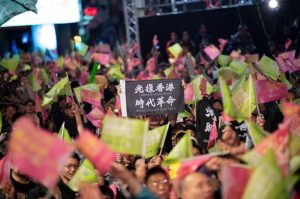Taiwan’s contentious presidential race is over, and the incumbent, Tsai Ing-wen of the Democratic Progressive Party, has been re-elected with over 8 million votes, a record in Taiwan’s history.
With the ongoing Hong Kong protests and the barrage of fake news during the campaigns, the elections were about cross-strait relations more than any other issue. Voters went to the polls to decide between continuing Tsai’s arms-length policy approach to China or switching to rival candidate Han Kuo-yu’s proposal to renew relations across the strait. They overwhelmingly selected Tsai despite Beijing’s warning that cross-strait relations will worsen under a second Tsai administration. Clearly the voters in Taiwan have decided that if relations remain chilly, it will be because Beijing rebuffs Tsai’s cautious approach to cross-strait interactions.
The impact of cross-strait issues on the election cannot be understated, particularly because Tsai won the presidency while the DPP lost seven seats (though maintaining a majority) in the Legislative Yuan. The Hong Kong protests, which passed their half-year mark in November 2019, have been interpreted by Taiwanese as a failure of the “one country, two systems” model that Beijing proposes for Taiwan as well. A successful argument of the DPP campaign, bolstered by a late-campaign video, was that the situation in Hong Kong was portentous for Taiwan — a democracy with an expiration date, under siege from the mainland government. It was clear how much the protests rattled Tsai’s strong and peripheral supporters, while Han failed to sufficiently temper his China-friendly image to reflect public sentiment. The Hong Kong effect explains Tsai’s personal victory despite the DPP’s poor performance in the legislative election: public confidence in her cross-strait position pushed her to surpass her 2016 vote count, despite suffering in polls over the past couple of years after controversial legislation like marriage equality, pension reform, and anti-infiltration laws. The sense in Taipei is that Tsai’s cross-strait policy has been chosen, not necessarily the DPP’s broader domestic platform.
The fake news phenomenon also had a jarring influence on the election. Fake news flooded social media and online forums from sources in inside and outside of Taiwan, and both camps accused the other of wielding fake news too. Analysts of information warfare pointed out that attribution of fake news was difficult to prove with any certainty, but the general perception in Taiwan is that a significant portion of fake news either originated from the mainland or served Beijing’s purpose of undermining Taiwan’s democracy. At the core of the problem was how fake news in Taiwan exploited and exacerbated cleavages in Taiwan’s society to increase distrust of the government and the electoral process and among voters. Whether or not the fake news came from or was funded by mainland actors, the intense debate around fake news and how to combat it to preserve the election’s integrity, as well as freedom of speech — a thornier issue — was a major factor in voters’ calculus.
In the next four years, both sides of the strait will need to proceed with care. Beijing must understand that January 11 signaled voters’ approval for Tsai to implement her policies, including on cross-strait relations, despite (and to some extent because of) outside pressure. Whether or not Beijing sees this democratic process as legitimate, it cannot avoid the reality that voters did not prefer a closer relationship with the mainland this time.
Likewise, Taipei under the second Tsai administration will contend with its own reality, that the elements of “peace, parity, democracy, and dialogue” that Tsai discussed in her victory speech require a level of cooperation that Beijing is not necessarily interested in providing at this time. The status quo is a tense sort of peace, but in the gray zone Taiwan constantly deals with cyberattacks from the mainland, as well as threatening rhetoric. Beijing’s comment after the election that it opposed “separatist conspiracy” in Taiwan indicates that parity, or each side’s acknowledgment of the other’s existence, and democracy, Taiwan’s people’s right to determine their future, have hard limits in Beijing’s understanding of Taiwan. Dialogue, too, suffers from a lack of open official channels since the downturn in relations after Tsai’s first election. Tsai’s parameters for stable cross-strait relations hold the course from her first administration, suggesting that the next move is Beijing’s. But her emphatic rejection of mainland intimidation in the wake of her victory also indicates that Beijing’s hardline policy needs a serious recalibration.
Whether Beijing and Taipei can achieve a level of understanding in the next four years that allows for dialogue and is founded on mutual respect remains to be seen. Initial statements aside, both sides in 2020 are different from 2016. They both face urgent challenges, from the trade war to Hong Kong to their own cross-strait tensions, and they both are looking ahead to changing variables later in 2020, including the U.S. presidential election. The second Tsai administration begins with a plea to Beijing for peaceful and stable cross-strait relations, and with Beijing’s predictable warnings in response, but there is much room for evolution, and pragmatic policymaking on both sides in the next four years.
Pam Kennedy is a research analyst with the East Asia Program at the Stimson Center in Washington, DC.

































